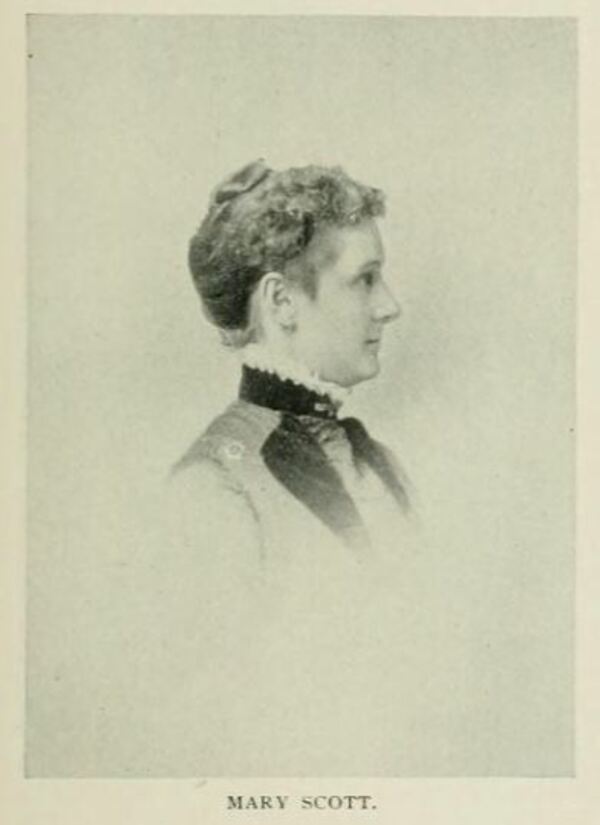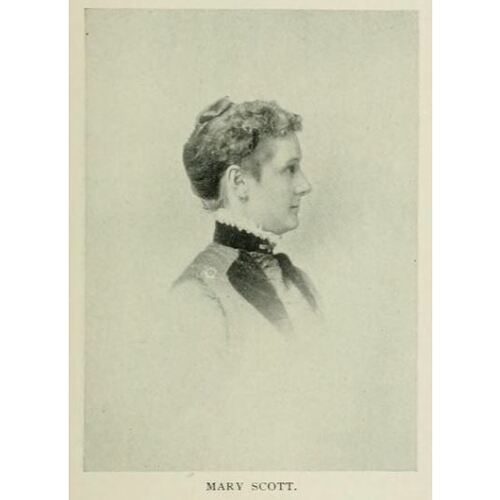
Source: Link
SCOTT, MARY M
Mary McKay Scott was born into a family that was well known in Bytown (renamed Ottawa in 1854). Her father was a successful baker and businessman, and her mother was a niece of Thomas McKay*, a locally prominent contractor, businessman, and political leader. The family’s wealth and status made it possible for Mary to receive an extensive private education, which included her attendance at the prestigious Bute House School in Montreal. A music lover, she learned to play the piano. The Scotts were Presbyterians who worshipped at St Andrew’s Church, where Mary would teach Sunday school for 30 years. After church union in 1925 [see Samuel Dwight Chown; Clarence Dunlop Mackinnon], she belonged to the United Church of Canada and was a member of its Chalmers congregation in Ottawa.
In 1882 Scott joined the Ontario Woman’s Christian Temperance Union (WCTU), whose leading figures included Letitia Youmans [Creighton*] and Annie Rutherford [Orchard]. Over the next 16 years Scott would be among the most successful leaders in both the Ontario WCTU and the Dominion WCTU, established in 1883. She became press superintendent of the Ontario organization in 1882 and took charge of its literature department soon afterwards. In 1884 she began a 14-year tenure as editor of the Woman’s Journal (Ottawa), and in 1889 she succeeded Adeline Chisholm [Davis*] as publisher. Under Scott’s leadership the monthly Journal, which consisted of informative articles and educational fiction, became the official publication of the Ontario WCTU. At its peak it had more than 4,000 subscribers and its readers could be found in places as distant as New Zealand and Japan.
Scott was crucial to the WCTU’s success with young women. She was committed to the education of young people, a cause she served through her work as a Sunday school teacher and in the press and literature departments. In 1886, in the Ontario WCTU’s annual report, she asked: “Do you ever think that if we were to stop the work of young women in the world, at the present day, what a blank there would be? Take away the bright, earnest, young teachers out of the Sunday Schools, the teachers from the Day Schools, stop the Mission Bands, Sewing Societies, Church socials, everything in fact in which young women are concerned and just think what the world would be like.” It is not surprising that Scott became the first superintendent of the Young Woman’s Christian Temperance Union (YWCTU) after it became an official affiliate of the Dominion WCTU in 1889, since she had already held that role in the provincial YWCTU for several years. The YWCTU was among the most active of the national organization’s departments. She also took leadership roles in other bodies. Scott was president of the Ottawa branch of the Young Women’s Christian Association in the late 1890s, and a delegate to the YWCA’s world conference in Berlin in 1910. She also headed the Ottawa Girl Guides and was involved in the National Council of Women, whose first president was Lady Aberdeen [Marjoribanks].
Scott’s involvement in the WCTU had decreased by the turn of the 20th century, when the organization’s influence was beginning to wane. Her central role in the success of the Woman’s Journal is evident from the fact that its fortunes declined and it ceased publication five years after her retirement in 1898. The experience of editing a journal with wide circulation was extremely rare for a Canadian woman at the time, and Scott developed an expertise that she used in other areas. On 12 Jan. 1900 she obtained a temporary position with the inside service (headquarters staff) of Clifford Sifton*’s Department of the Interior. On 1 July 1904 she received a permanent appointment as a third-class clerk at the modest salary of $550 per year. The Liberal government of Sir Wilfrid Laurier* was encouraging immigration to the western provinces and territories, and Scott penned weekly missives on the country’s news and resources that were cabled to the office of the Canadian high commissioner in London. According to her obituary in the Ottawa Evening Citizen, these reports served as “one of the best advertisements Canada ever had.” By 1921 her salary had risen to $1,500; she retired approximately three years later.
Scott wrote for publications in the Ottawa area under the pseudonym Yarrow, and she contributed to American journals as well. A collection of her work, From the Gatineau hills, was published around 1930. She held no positions in the WCTU in her later years, but she continued to support the organization and delivered an address at its 50th jubilee party in Ottawa in 1927. Scott was involved in networks for women journalists, including the local branch of the Canadian Women’s Press Club, until the early 1930s. An active participant in the Woman’s Missionary Society of the United Church, she presided over one of its meetings a month before she died of myocarditis in October 1932, at the age of 81.
Mary McKay Scott was in many ways both typical of and exceptional for her time. Like many women, she was well known in her hometown, she was involved in the temperance movement and church work, and she sought to improve society in general and the conditions faced by women in particular. What gave her more than a local influence was her writing, which connected her with thousands of readers. Yet, since her articles often carried no byline or were followed by a pseudonym, many of those who benefited from Scott’s leadership never knew her name.
Mary McKay Scott, writing as Yarrow, is the author of From the Gatineau hills ([Ottawa, 1930?]), a copy of which is held by LAC. The July 1886 issue of the Woman’s Journal (Ottawa) can be found online at www.canadiana.ca/view/oocihm.8_06695.
Ancestry.com, “Ottawa, Canada, Beechwood Cemetery reg., 1873–1990,” Mary McKay Scott: www.ancestry.ca/search/collections/2168 (consulted 13 Sept. 2023). AO, F 885 (Canadian Woman’s Christian Temperance Union fonds). LAC, R233-36-4, Ont., dist. Ottawa (103), subdist. Wellington Ward (E), div. 1: 10–11; R233-37-6, Ont., dist. Ottawa (100), subdist. Central Ward (B), div. 7: 4; R3160-0-9 (Alexander Scott fonds). Ottawa Citizen, 22 May 1907; 7 Oct. 1910; 4 Oct. 1927; 14 June 1930; 14 Sept., 25 Oct. 1932. Can., Dept. of the Secretary of State, The civil service list of Canada … (Ottawa), 1900–18. Canadian men and women of the time (Morgan; 1898). Canadian who’s who, 1910. S. A. Cook, “Through sunshine and shadow”: the Woman’s Christian Temperance Union, evangelicalism, and reform in Ontario, 1874–1930 (Montreal and Kingston, Ont., 1995). Carole Gerson, Canadian women in print, 1750–1918 (Waterloo, Ont., 2010). Handbook of the National Council of Women of Canada … (Ottawa, 1899). S. G. E[lwood] McKee, Jubilee history of the Ontario Woman’s Christian Temperance Union, 1877–1927 (Whitby, Ont., [1927?]). The prohibition leaders of America, ed. B. F. Austin (St Thomas, Ont., 1895).
Cite This Article
Patricia Kmiec, “SCOTT, MARY McKAY,” in Dictionary of Canadian Biography, vol. 16, University of Toronto/Université Laval, 2003–, accessed December 12, 2025, https://www.biographi.ca/en/bio/scott_mary_mckay_16E.html.
The citation above shows the format for footnotes and endnotes according to the Chicago manual of style (16th edition). Information to be used in other citation formats:
| Permalink: | https://www.biographi.ca/en/bio/scott_mary_mckay_16E.html |
| Author of Article: | Patricia Kmiec |
| Title of Article: | SCOTT, MARY McKAY |
| Publication Name: | Dictionary of Canadian Biography, vol. 16 |
| Publisher: | University of Toronto/Université Laval |
| Year of publication: | 2024 |
| Year of revision: | 2024 |
| Access Date: | December 12, 2025 |



